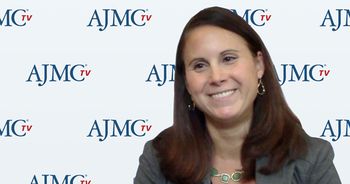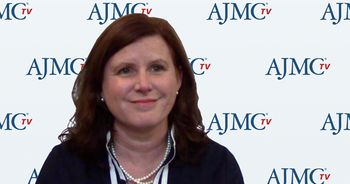
Value-Based Care
Latest News

Latest Videos

CME Content
More News

There are different ways to measure how Medicare Shared Savings Program (MSSP) accountable care organizations (ACOs) have saved money, and the way used can drastically affect the amount of savings reported, explained Clif Gaus, ScD, president and CEO of the National Association of ACOs.

Systems, groups, and practices that haven’t yet joined the accountable care organization (ACO) movement will find it harder to do so if the proposed changes to the Medicare Shared Savings Program (MSSP) take effect, said Rob Fields, MD, assistant profession, family medicine and community health, Icahn School of Medicine at Mount Sinai, and senior vice president, chief medical officer, population health at Mount Sinai Health System.

Some of the proposed changes to the Medicare Shared Savings Program align with things the National Association of ACOs had been asking for, said Allison Brennan, MPP, senior vice president of government affairs for the National Association of ACOs.

The proposed changes to the Medicare Shared Savings Program (MSSP) acknowledge the complexity of the program and bring more predictability and stability to MSSP, according to Katherine Schneider, MD, MPhil, FAAFP, president and CEO of Delaware Valley ACO.

The proposed risk adjustment changes to the Medicare Shared Savings Program (MSSP) are welcome but moving accountable care organizations (ACOs) to risk too soon could harm the program, said Stephen Nuckolls, CEO of Coastal Carolina Quality Care.

CMS’ proposed changes to the Medicare Shared Savings Program (MSSP) doesn’t represent a major shift in policy stance toward accountable care organizations (ACOs), said Joe Antos, PhD, the Wilson H. Taylor Resident Scholar in Health Care and Retirement Policy at the American Enterprise Institute.

By encouraging more providers to take on risk faster, the current administration may actually be disincentivizing providers from participating at all, which would reduce the number of accountable care organizations (ACOs), said Allison Brennan, MPP, senior vice president of government affairs for the National Association of ACOs.

Private payers are getting more engaged in accountable care organizations (ACOs), said Clif Gaus, ScD, president and CEO of the National Association of ACOs.

The proposed changes to the Medicare Shared Savings Program that move accountable care organizations (ACOs) to take on risk in just 2 years is not going to be enough time for most ACOs, although some may be ready in that time, said Stephen Nuckolls, CEO of Coastal Carolina Quality Care.

Contracts for accountable care organizations (ACOs) can be very different depending on who the payer is, according to Katherine Schneider, MD, MPhil, FAAFP, president and CEO of Delaware Valley ACO.

CMS’ accountable care organization program, the Medicare Shared Savings Program (MSSP), could potentially be undergoing some big changes. During the recent fall 2018 meeting of the National Association of ACOs (NAACOS), the proposed changes were top of mind. Attendees were most concerned about how the faster timeline to taking on risk would impact participation, but were pleased with changes to the benchmark and risk adjustment.

At the National Association of ACOs Fall 2018 conference, private payers discussed how they are working with accountable care organizations (ACOs) to create new opportunities in the commercial market.

Rob Fields, MD, assistant profession, family medicine and community health, Icahn School of Medicine at Mount Sinai, and senior vice president, chief medical officer, population health at Mount Sinai Health System, discusses how Mount Sinai’s accountable care organizations (ACOs) will have to adjust to the proposed CMS Medicare Shared Savings Program (MSSP) changes.

Physician practices intending to join Medicare accountable care organizations (ACOs) in 2012 had greater capabilities in health information technology, care management processes, and quality improvement methods than those not intending to join, but they still were far from using all recommended behaviors to manage risk.

Every week, The American Journal of Managed Care® recaps the top managed care news of the week, and you can now listen to it on our podcast, Managed Care Cast.

Accountable care organizations (ACOs) often care for patients with complex, chronic conditions that can lead to high expenditures and utilization of care. During a session at the National Association of ACOs Fall 2018 conference, being held October 3-5 in Washington, DC, panelists discussed how ACOs can design and implement strategies that deliver high-quality, low-cost care for these patients.

This week, the top managed care news included the Nobel Prize in Medicine was awarded to 2 people for research into immunotherapy; physician-run accountable care organizations bring savings for Medicare; research highlights the health impacts of sexual harassment and assault.

More frequent electronic health record (EHR) message forwarding in primary care teams is associated with worse outcomes and higher medical costs for patients with diabetes.

At the National Association of ACOs Fall 2018 conference, being held October 3-5 in Washington, DC, panelists shared successful innovative initiatives that have been developed by their accountable care organizations (ACOs). What worked and what did not was the focus of the conversation led by Debbie Welle-Powell, chief population health officer, Essentia Health.

For 2017, New Jersey's largest insurer made particularly good progress in certain diabetes measures and in cancer screenings.

Optimal end-stage renal disease (ESRD) starts were associated with lower 12-month morbidity, mortality, and inpatient and outpatient utilization in an integrated healthcare delivery system.

As the term “value” has become a norm in healthcare, specifically in oncology, panelists at a National Comprehensive Cancer Network policy summit offered perspectives on where we are now in delivering high-quality cancer care under value-based payment models.

CMS implemented the Categorical Adjustment Index as part of the Medicare Advantage and Part D Star Rating Program in 2017. These analyses informed its development. Check out our website’s new table/figure pop-up feature! Click on the name of a table or figure in the text to see it in your browser.

Every week, The American Journal of Managed Care® recaps the top managed care news of the week, and you can now listen to it on our podcast, Managed Care Cast.

In 2016, the Next Generation Accountable Care Organization (ACO) model generated a net savings of $62 million to Medicare, representing a 1.1% net reduction in Medicare spending. In a webcast with the Accountable Care Learning Collaborative, CMS Administrator Seema Verma called the results a strong start and offered a look at what's in the future for the model.


















